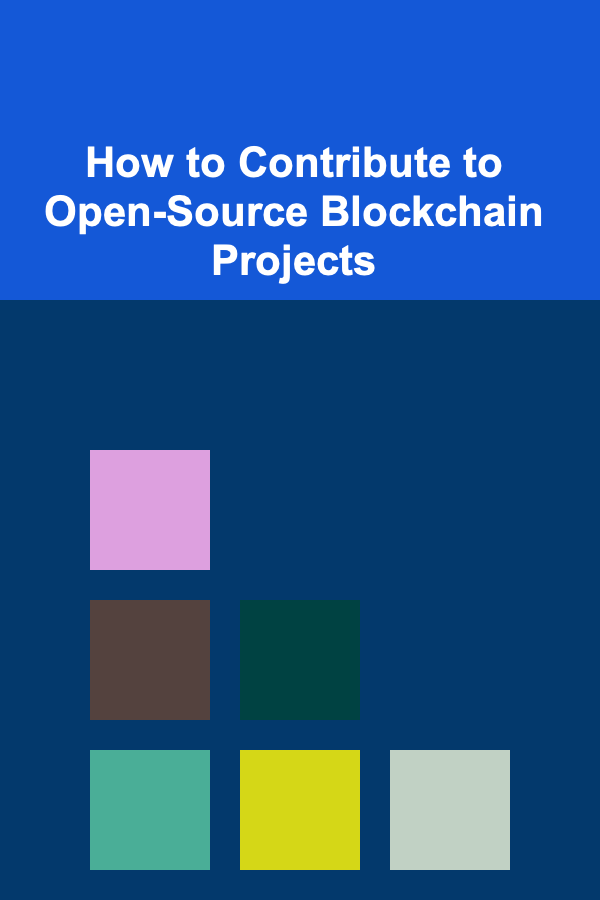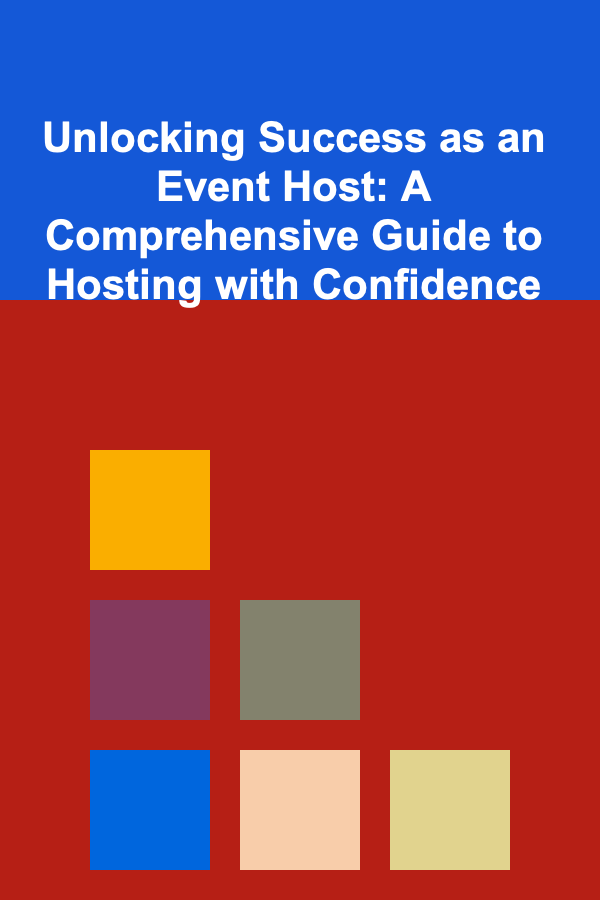
How to Contribute to Open-Source Blockchain Projects
ebook include PDF & Audio bundle (Micro Guide)
$12.99$10.99
Limited Time Offer! Order within the next:

Open-source blockchain projects are becoming increasingly vital in the world of decentralized technologies. From cryptocurrencies like Bitcoin to enterprise-level solutions, blockchain has revolutionized many industries. However, like any software development initiative, blockchain projects require ongoing development, improvement, and maintenance, which creates a unique opportunity for developers, enthusiasts, and contributors to engage and make a difference.
Contributing to open-source blockchain projects is not only a way to give back to the community but also a way to enhance your own skills and network with other experts in the field. In this article, we will explore the various aspects of contributing to open-source blockchain projects, including understanding blockchain fundamentals, identifying where to contribute, and navigating the process effectively.
Understanding the Blockchain Landscape
Before diving into contributions, it's essential to have a solid understanding of what blockchain technology is and its key components. Blockchain is a distributed, decentralized ledger system that allows for secure, transparent, and immutable record-keeping. It is the underlying technology behind cryptocurrencies like Bitcoin, Ethereum, and many others.
Key Concepts in Blockchain Technology
- Distributed Ledger: Blockchain relies on a distributed ledger, meaning that data is stored across a network of computers (or nodes). No single entity controls the data, which promotes transparency and security.
- Cryptographic Hashing: Blockchain utilizes cryptographic techniques to ensure that data cannot be tampered with. Each block of data is linked to the previous block through a cryptographic hash, ensuring immutability.
- Smart Contracts: Smart contracts are self-executing contracts with the terms of the agreement directly written into code. They are used primarily in platforms like Ethereum to automate various processes and transactions without requiring intermediaries.
- Consensus Algorithms: These are protocols that ensure all participants in the blockchain network agree on the validity of transactions. Popular consensus mechanisms include Proof of Work (PoW) and Proof of Stake (PoS).
- Tokens and Cryptocurrencies: Cryptocurrencies like Bitcoin and Ether are digital assets built on blockchain technology. These are often used to incentivize participation in blockchain networks.
Understanding these fundamental concepts will help you navigate the landscape of open-source blockchain projects, as most projects build upon these core ideas.
Why Contribute to Open-Source Blockchain Projects?
Contributing to open-source blockchain projects is not just about writing code. It offers several benefits, both personal and professional. Here are some reasons why you should consider contributing:
Personal Growth and Skill Development
Contributing to blockchain projects can significantly enhance your coding and technical skills. Whether you're working on the backend infrastructure, smart contracts, or user interfaces, you'll gain valuable experience in cutting-edge technologies such as:
- Cryptography and security: Blockchain heavily relies on cryptographic methods to secure data. Contributing to blockchain projects can deepen your understanding of cryptographic principles.
- Decentralized applications (dApps): Working with blockchain technologies often involves developing dApps, which are distributed applications that run on a blockchain platform.
- Distributed systems: Blockchain is a prime example of a distributed system. Contributing can give you hands-on experience with scaling, fault tolerance, and consensus protocols.
Networking and Collaboration
Open-source blockchain projects bring together developers from around the world. By contributing, you'll have the opportunity to collaborate with like-minded individuals, learn from experienced developers, and even get the chance to network with industry leaders. Contributing is an excellent way to showcase your skills and get noticed by other professionals in the space.
Impact and Innovation
Open-source contributions give you the chance to help shape the future of decentralized technologies. By fixing bugs, adding new features, or improving documentation, you can directly impact the evolution of a blockchain project. Moreover, open-source contributions are often highly visible, allowing you to leave your mark on the blockchain community.
Identifying Open-Source Blockchain Projects to Contribute To
The next step is identifying blockchain projects that are open to contributions. Given the rapid growth of the blockchain ecosystem, there are countless projects you can get involved in. Here's how to find a project that matches your skills and interests:
Popular Platforms Hosting Open-Source Blockchain Projects
- GitHub: GitHub is the central hub for open-source software development. Many blockchain projects, including those for Ethereum, Bitcoin, and other prominent blockchain platforms, are hosted here. You can search for repositories tagged with blockchain or related terms.
- GitLab: Another platform similar to GitHub, GitLab hosts open-source blockchain projects and provides a rich set of tools for collaboration and continuous integration/continuous deployment (CI/CD).
- Open-Source Blockchain Communities: Many blockchain projects have dedicated communities where you can find information about open issues, documentation, and the contributions required. Examples include the Ethereum Foundation, Hyperledger, and Polkadot's GitHub repositories.
Finding Projects that Align with Your Skills
Not all blockchain projects are the same, and their technical requirements can vary widely. Some projects may require expertise in specific programming languages like Go, Solidity, or Rust, while others may require knowledge of certain platforms like Ethereum, Bitcoin, or Cardano.
- Beginner Projects: If you're new to blockchain development, look for projects that have labeled "good first issue" or "beginner-friendly" tags. These projects are often looking for newcomers to help with simple tasks and can be a great entry point into the blockchain space.
- Advanced Projects: If you have advanced knowledge of blockchain, consider contributing to projects that are tackling cutting-edge technologies, such as layer-two scaling solutions (e.g., Lightning Network), privacy coins, or cross-chain interoperability.
Checking the Project's Activity and Community
Before contributing to any project, it's crucial to assess the health of the project. Look for projects with active communities and maintainers. You can check:
- Commit Frequency: Is the project regularly updated? If a project hasn't had any commits in months, it may not be active or well-maintained.
- Community Engagement: Is there an active discussion on issues, pull requests, and updates? Healthy projects have a vibrant community where developers, users, and maintainers interact regularly.
- Documentation: A well-documented project is easier to contribute to. Check if the project has comprehensive README files, contributing guidelines, and a clear roadmap.
How to Start Contributing
Once you've identified a project, the next step is to get started. The process of contributing to an open-source blockchain project can vary from one project to another, but here's a general guideline to follow:
Step 1: Fork the Repository
The first step is to fork the project's repository to your GitHub account. Forking creates a copy of the project where you can work on your changes without affecting the main codebase. Once you've forked the repository, you can clone it to your local machine to start working on it.
Step 2: Understand the Project's Codebase
Before making any changes, take the time to familiarize yourself with the project's codebase. Understanding the architecture and logic behind the code will help you contribute more effectively. Look for key files and documentation that explain the system's components and how they interact.
- Set Up the Development Environment: Many blockchain projects require specific software or dependencies. Follow the setup instructions in the README file to install the necessary tools and dependencies.
- Read Existing Issues: GitHub issues are a good place to find tasks and bugs that need attention. Review open issues and try to pick one that matches your skill level.
Step 3: Identify an Issue to Work On
Most open-source projects have a list of open issues that need attention. When choosing an issue, look for tasks labeled as "help wanted," "good first issue," or "bug fix." These are often great places to start if you're new to the project.
Once you've selected an issue, be sure to check the issue's comments and related pull requests to ensure that it hasn't already been resolved or worked on by another contributor.
Step 4: Make Your Changes and Test Locally
Once you've understood the codebase and selected an issue, start working on your changes. Ensure that your code adheres to the project's coding standards and follow the guidelines in the contributing documentation.
Testing is an essential step in blockchain development. Blockchain applications often deal with sensitive data and financial transactions, so testing is crucial to ensure that your changes don't introduce any vulnerabilities or bugs.
- Unit Testing: Write unit tests to ensure that individual components of the project are functioning as expected.
- Integration Testing: Test the interaction between different components of the blockchain system to ensure that they work seamlessly together.
- Security Testing: Blockchain applications often involve transactions or smart contracts that need to be secure. Make sure to test for potential vulnerabilities and fix any security flaws.
Step 5: Submit a Pull Request
Once you've completed your changes and tested them, it's time to submit a pull request (PR). A pull request is a proposal to merge your changes into the project's main codebase.
When submitting a PR, make sure to include:
- A Detailed Description: Explain what changes you made, why they're important, and how they address the issue.
- Link to the Relevant Issue: Reference the issue you are addressing in the PR to make it clear why your changes are needed.
- Follow the PR Guidelines: Many projects have specific guidelines for submitting PRs, including formatting, test coverage, and documentation requirements. Be sure to follow them to avoid delays.
Step 6: Respond to Feedback and Iterate
Once your pull request is submitted, project maintainers and community members will review your changes. They may ask you to make improvements, fix bugs, or follow different coding practices. Be open to feedback and iterate on your work to ensure that your contribution aligns with the project's vision and standards.
Advanced Contributions
As you gain experience in contributing to blockchain projects, you can start exploring more advanced areas of blockchain development. Some potential areas for contribution include:
- Developing Smart Contracts: Many blockchain platforms, like Ethereum, rely on smart contracts to automate processes. Contributing to smart contract development requires knowledge of languages like Solidity or Vyper.
- Layer-2 Scaling Solutions: Layer-2 solutions, such as the Lightning Network for Bitcoin, are designed to improve the scalability and performance of blockchain networks. Contributing to these solutions requires deep technical knowledge of blockchain protocols.
- Security Auditing: Blockchain systems often deal with financial transactions and sensitive data. Contributing to blockchain security involves auditing smart contracts or transaction protocols to identify potential vulnerabilities.
Conclusion
Contributing to open-source blockchain projects is an excellent way to enhance your skills, collaborate with the global blockchain community, and make a tangible impact on decentralized technologies. Whether you're a beginner or an experienced developer, there's always something valuable you can contribute to the blockchain ecosystem.
By understanding the fundamentals of blockchain, finding the right project, and following the proper contribution process, you can make meaningful contributions to open-source blockchain projects. Remember, open-source contributions are about collaboration and growth, so engage with the community, seek feedback, and enjoy the journey of building the decentralized future together.

10 Effective Tips for Saving on Home Energy Bills Year-Round
Read More
How to Host an Antique Show-and-Tell Event
Read More
How to Review Your Financial Advisor's Fee for Service: A Comprehensive Guide
Read More
How to Use Your Typing Skills for Content Writing and Blogging
Read More
Unlocking Success as an Event Host: A Comprehensive Guide to Hosting with Confidence
Read More
How to Prep Your Pet for Holiday Travel
Read MoreOther Products

10 Effective Tips for Saving on Home Energy Bills Year-Round
Read More
How to Host an Antique Show-and-Tell Event
Read More
How to Review Your Financial Advisor's Fee for Service: A Comprehensive Guide
Read More
How to Use Your Typing Skills for Content Writing and Blogging
Read More
Unlocking Success as an Event Host: A Comprehensive Guide to Hosting with Confidence
Read More